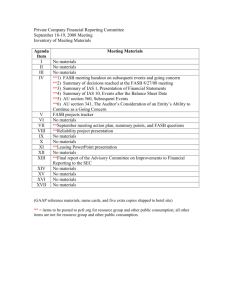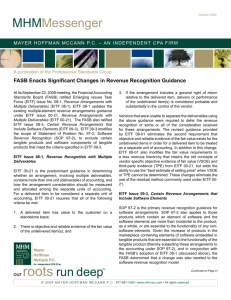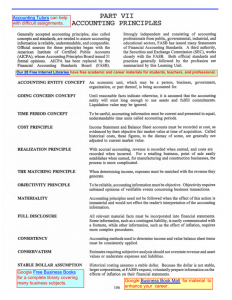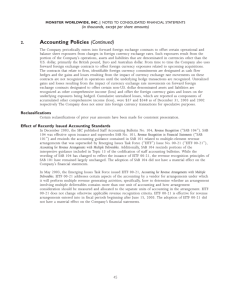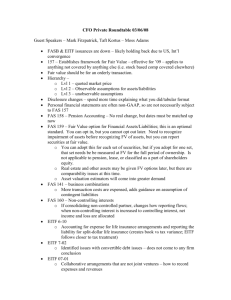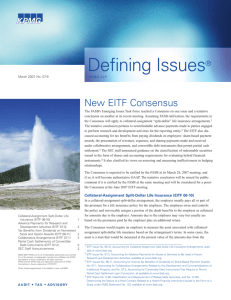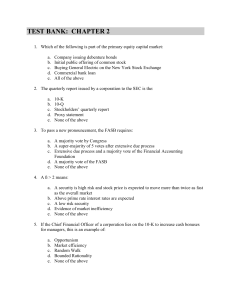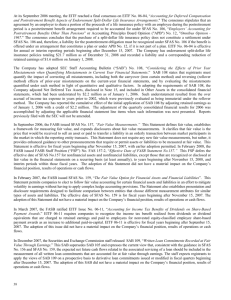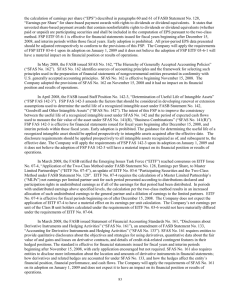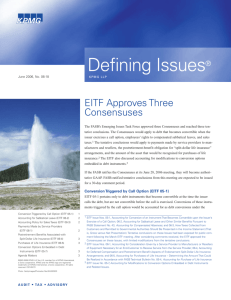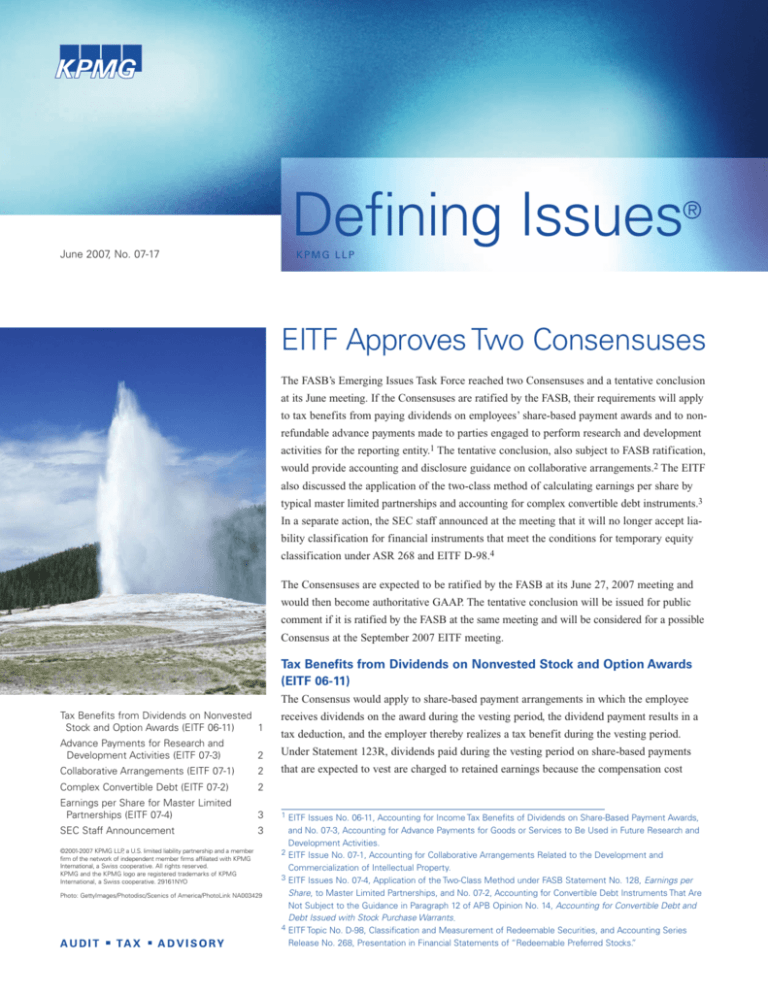
Defining Issues
®
June 2007, No. 07-17
KPMG LLP
EITF Approves Two Consensuses
The FASB’s Emerging Issues Task Force reached two Consensuses and a tentative conclusion
at its June meeting. If the Consensuses are ratified by the FASB, their requirements will apply
to tax benefits from paying dividends on employees’ share-based payment awards and to nonrefundable advance payments made to parties engaged to perform research and development
activities for the reporting entity.1 The tentative conclusion, also subject to FASB ratification,
would provide accounting and disclosure guidance on collaborative arrangements.2 The EITF
also discussed the application of the two-class method of calculating earnings per share by
typical master limited partnerships and accounting for complex convertible debt instruments.3
In a separate action, the SEC staff announced at the meeting that it will no longer accept liability classification for financial instruments that meet the conditions for temporary equity
classification under ASR 268 and EITF D-98.4
The Consensuses are expected to be ratified by the FASB at its June 27, 2007 meeting and
would then become authoritative GAAP. The tentative conclusion will be issued for public
comment if it is ratified by the FASB at the same meeting and will be considered for a possible
Consensus at the September 2007 EITF meeting.
Tax Benefits from Dividends on Nonvested Stock and Option Awards
(EITF 06-11)
The Consensus would apply to share-based payment arrangements in which the employee
Tax Benefits from Dividends on Nonvested
Stock and Option Awards (EITF 06-11)
1
receives dividends on the award during the vesting period, the dividend payment results in a
tax deduction, and the employer thereby realizes a tax benefit during the vesting period.
Advance Payments for Research and
Development Activities (EITF 07-3)
2
Under Statement 123R, dividends paid during the vesting period on share-based payments
Collaborative Arrangements (EITF 07-1)
2
that are expected to vest are charged to retained earnings because the compensation cost
Complex Convertible Debt (EITF 07-2)
2
Earnings per Share for Master Limited
Partnerships (EITF 07-4)
3
1 EITF Issues No. 06-11, Accounting for Income Tax Benefits of Dividends on Share-Based Payment Awards,
SEC Staff Announcement
3
and No. 07-3, Accounting for Advance Payments for Goods or Services to Be Used in Future Research and
Development Activities.
2 EITF Issue No. 07-1, Accounting for Collaborative Arrangements Related to the Development and
Commercialization of Intellectual Property.
3 EITF Issues No. 07-4, Application of the Two-Class Method under FASB Statement No. 128, Earnings per
Share, to Master Limited Partnerships, and No. 07-2, Accounting for Convertible Debt Instruments That Are
Not Subject to the Guidance in Paragraph 12 of APB Opinion No. 14, Accounting for Convertible Debt and
Debt Issued with Stock Purchase Warrants.
4 EITF Topic No. D-98, Classification and Measurement of Redeemable Securities, and Accounting Series
Release No. 268, Presentation in Financial Statements of “Redeemable Preferred Stocks.”
©2001-2007 KPMG LLP, a U.S. limited liability partnership and a member
firm of the network of independent member firms affiliated with KPMG
International, a Swiss cooperative. All rights reserved.
KPMG and the KPMG logo are registered trademarks of KPMG
International, a Swiss cooperative. 29161NYO
Photo: GettyImages/Photodisc/Scenics of America/PhotoLink NA003429
Defining Issues June 2007, No. 07-17 2
already reflects the expected value of those
has not yet performed the related activities.
net based on the criteria in EITF 99-19 and
dividends, which are included in the grant
Amounts capitalized would be recognized as
other accounting literature.8 Payments to or
date fair value of the award.5 But dividends
expense when the research-and-development
from collaborators would be evaluated and
on awards that do not vest are recognized as
activities are performed, that is, when the
presented based on the nature of the arrange-
additional compensation cost.
goods without alternative future use are
ment and its contractual terms, the nature of
acquired or the service is
rendered.6
The Consensus would require the tax benefit
ments are within the scope of other account-
received on dividends associated with share-
The Consensus is to be applied prospectively
based awards that are charged to retained
for new contractual arrangements entered
earnings to be recorded in additional paid-in
into in fiscal years beginning after
capital and included in the pool of excess tax
December 15, 2007.
benefits available to absorb potential future
tax deficiencies on share-based payment
awards. A tax benefit recognized from a dividend on an award that is subsequently forfeited or is no longer expected to vest (and
that is therefore reclassified as additional
compensation expense) would be reclassified
to the income statement if sufficient excess
tax benefits are available in the pool of excess
tax benefits in additional paid-in capital on
the date of the reclassification.
The Consensus would be effective for the tax
benefits of dividends declared in fiscal years
beginning after December 15, 2007.
the entity’s business, and whether those paying literature. The nature and purpose of an
entity’s collaborative arrangements would
have to be disclosed in annual financial
statements, along with the entity’s account-
Collaborative Arrangements
(EITF 07-1)
ing policies for the arrangements and the
Many companies in industries such as
financial-statement amounts related to the
biotechnology, pharmaceuticals, and motion
arrangements.
pictures jointly develop and commercialize
intellectual property, in some cases, without
creating a separate legal entity. If there is no
separate legal entity, the arrangement is
sometimes operated as a “virtual joint venture” subject to oversight by a steering committee that includes representatives of each
party to the collaborative arrangement.
The EITF tentatively concluded that a collaborative arrangement is an arrangement in
Advance Payments for Research
and Development Activities
(EITF 07-3)
which the participants are actively involved
This Consensus would affect companies that
mercial success of the endeavor. The Task
make non-refundable advance payments to
Force also decided that the equity method of
acquire goods or pay for services that will be
accounting should not be applied to a collab-
consumed or performed in a future period in
orative arrangement unless a separate legal
conducting research and development activi-
entity is created to carry out its activities.7
ties on behalf of the entity. Under the
Instead, revenues and costs incurred with
Consensus, the up-front payments would be
third parties in connection with collaborative
recorded as an asset if the contracted party
arrangements would be presented gross or
and are exposed to significant risks and
rewards that depend on the ultimate com-
5 FASB Statement No. 123 (revised 2004), Share-Based Payment, December 2004, available at
www.fasb.org.
6 FASB Statement No. 2, Accounting for Research and Development Costs, available at www.fasb.org,
addresses the accounting for research and development costs.
7 APB Opinion No. 18, The Equity Method of Accounting for Investments in Common Stock, March 1971.
8 EITF Issue No. 99-19, Reporting Revenue Gross as a Principal versus Net as an Agent, available at
www.fasb.org.
9 APB Opinion No. 14, Accounting for Convertible Debt and Debt Issued with Stock Purchase Warrants,
March 1969.
10 FASB Statement No. 133, Accounting for Derivative Instruments and Hedging Activities, June 1998, avail-
able at www.fasb.org.
©2001-2007 KPMG LLP, a U.S. limited liability partnership and a member firm of the KPMG network of independent member firms affiliated with KPMG
International, a Swiss cooperative. All rights reserved. 29161NYO
classification and amount of significant
If the EITF reaches a Consensus on this issue
at a subsequent meeting and it is ratified by
the FASB, it would be effective for fiscal years
beginning after December 15, 2007. The
application of the Consensus would be reflected
by retrospective reclassification in all periods
presented, unless it is impracticable to do so.
Complex Convertible Debt
(EITF 07-2)
The Task Force discussed whether convertible
debt with complex features, such as partial
cash settlement provisions and variability in
the number of shares to be issued upon conversion, should be accounted for entirely as
debt under Opinion 14, and, if not, what is the
appropriate accounting for these instruments.9
The convertible debt in question excludes
instruments with embedded conversion features that must be separated as derivatives
under Statement 133.10
The EITF was unable to reach a conclusion and agreed to discontinue discussions of this
issue. However, the FASB members attending the meeting agreed to consider adding a shortterm project to the Board’s agenda to evaluate whether additional guidance is needed on the
scope of Opinion 14, including which instruments should be considered outside the scope of
Opinion 14 and accounted for using a different model.
Earnings per Share for Master Limited Partnerships (EITF 07-4)
A typical master limited partnership consists of publicly traded common units held by limited
partners, a general-partner interest, and interests in incentive distribution rights. The incentive
distribution rights are a separate class of non-voting limited-partner interest that the general
partner initially holds but can transfer or sell separately from the general partnership interest.
At the end of each quarter, the master limited partnership must distribute 100 percent of the
partnership’s “available cash,” based on a formula in the agreement, to the general and limited partners and the holders of incentive distribution rights.
The EITF discussed whether incentive distribution rights in a typical master limited partnership are participating securities under Statement 128 and whether the partnership should record
an allocation of the partnership’s undistributed current-period earnings to the rights holders
in periods in which earnings exceed distributions.11 The Task Force asked the FASB staff to
conduct additional research on these arrangements and will continue its discussion of the
issue at a future meeting.
This is a publication of KPMG’s
SEC Staff Announcement
The SEC staff announced that it will no longer accept liability classification for financial
Department of Professional
instruments that meet the conditions for temporary equity classification under ASR 268 and
Practice—Audit
EITF D-98. As a consequence, the fair value option under Statement 159 may not be applied
212-909-5600
Contributing authors:
Mark M. Bielstein
to any financial instrument (or host contract) that qualifies as temporary equity.12 Registrants
that do not choose retrospective application should apply the announcement prospectively to
all affected instruments that are entered into, modified, or otherwise subject to a remeasurement event in the registrant’s first fiscal quarter beginning after September 15, 2007.
Paul H. Munter
Joseph C. Macina
The descriptive and summary statements above are not intended to be a substitute for
Brian W. Fields
the texts of the EITF’s Consensuses, tentative conclusion, SEC staff announcement, official
minutes, or any other potential or actual requirements. In determining the appropriate
Earlier editions are available at:
www.us.kpmg.com/definingissues
Defining Issues® is a registered trademark of KPMG LLP.
© 2001-2007 KPMG LLP, a U.S. limited liability partnership and a
member firm of the network of independent member firms affiliated
with KPMG International, a Swiss cooperative. All rights reserved.
KPMG and the KPMG logo are registered trademarks of KPMG
International, a Swiss cooperative. 29161NYO
accounting treatment for a transaction, companies should refer to the texts of the applicable
documents that set out requirements, including the formal EITF meeting minutes and
Abstracts that are made available on the FASB Web site, consider their specific circumstances, and consult their accounting and legal advisors.
11 FASB Statement No. 128, Earnings per Share, February 1997, available at www.fasb.org.
12 FASB Statement No. 159, The Fair Value Option for Financial Assets and Financial Liabilities, February 2007,
available at www.fasb.org

